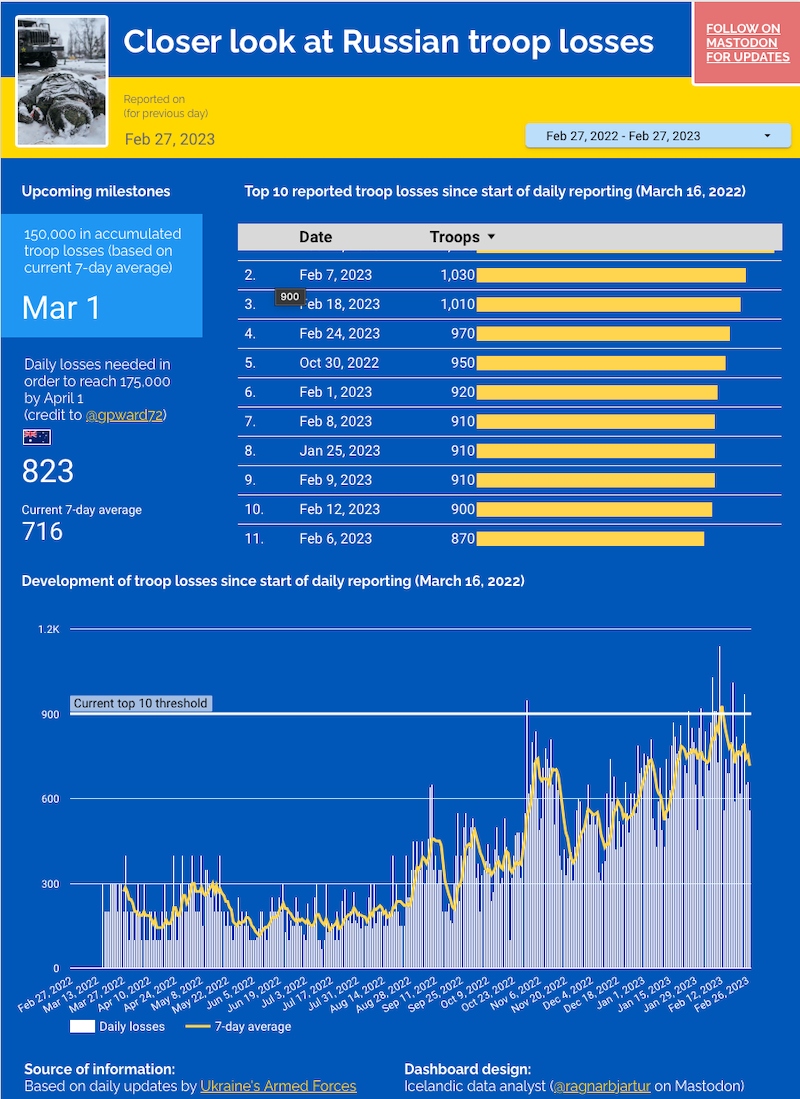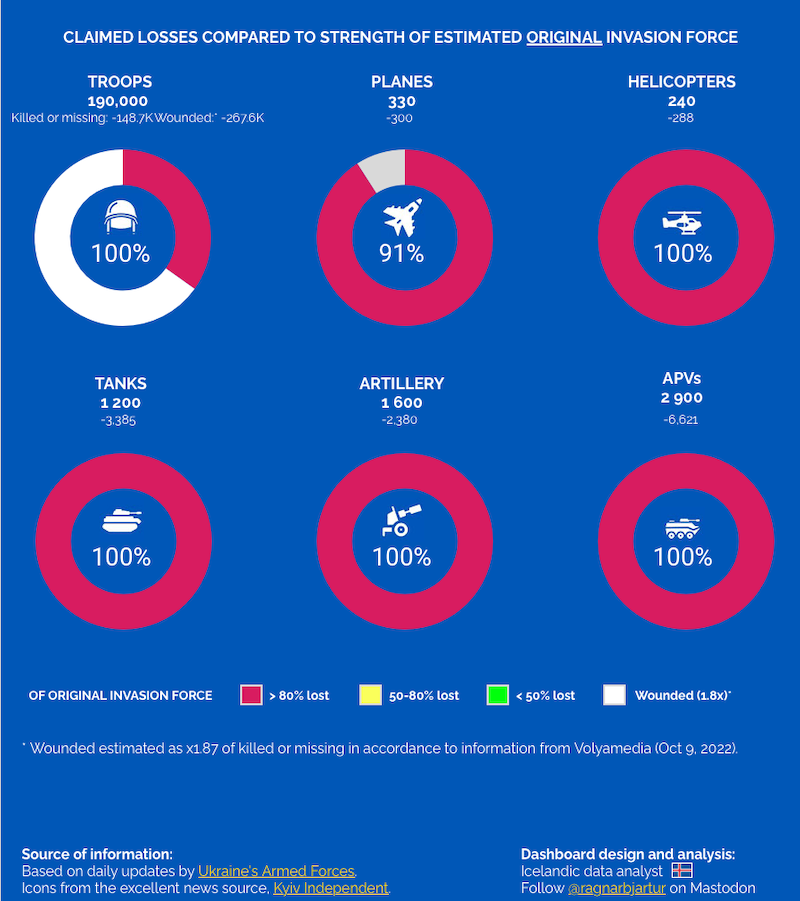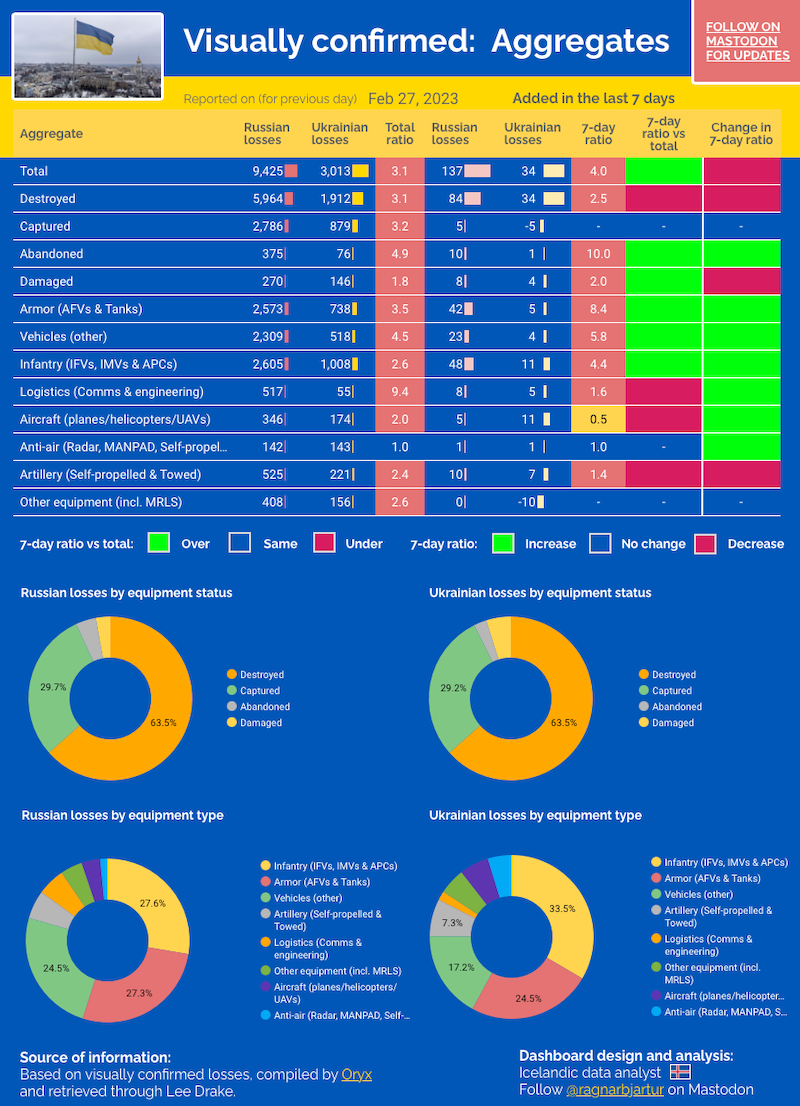The Ukraine war thread
-
I wager that all NATO members will soon have no choice other than to ramp up their military production and allocate fiscal resources into defence and security.
Will be a hard pill for the federal and even provincial governments in this country to have to swallow.
-
I wager that all NATO members will soon have no choice other than to ramp up their military production and allocate fiscal resources into defence and security.
Will be a hard pill for the federal and even provincial governments in this country to have to swallow.
@Renauda said in The Ukraine war thread:
I wager that all NATO members will soon have no choice other than to ramp up their military production and allocate fiscal resources into defence and security.
Will be a hard pill for the federal and even provincial governments in this country to have to swallow.
God, I hope they will.
-
Constitutionally in this country guns are a federal responsibility and butter is a provincial responsibility. I see no problem provided both are willing to cut duplication and waste.
I wish it were as simple in practice as the constitution defines it.
-
-
The story:
There has been quite the buzz this Sunday on social media about a supposed attack on a Russian A-50 Mainstay airborne early warning and control aircraft that is forward deployed to Machulishchy Air Base south of Minsk, in Belarus. We cannot confirm that this attack actually happened or the nature of the damage, if any, to the A-50 — the type has been a staple at the base throughout the war. But if it did occur, it would be a significant loss for the Russian Air Force and, depending on how it was carried out, it could be a sign of a developing front and what's to come in the now year-old war.
The image seen at the top of this article was taken on February 19th. It shows the A-50 in its usual spot at the Belarusian air base. Various claims state that the aircraft, a variant of the Il-76 quad-jet cargo transport, was attacked via drone and damaged if not destroyed. There are also claims that this was done by a partisan group inside Belarus, which would be a significant development if true.The target here is very important, regardless. The A-50s are very low-density, high-demand assets and are one of Russia's major advantages over Ukraine in terms of the air war. The A-50 provides general wide-area aerial surveillance and airborne command and control capabilities. Beyond this, and arguably most importantly, they provide the critical 'look-down' radar surveillance capability for Russia's air operations. As such, not only can they generate an 'air picture' deep into Ukraine, but this also includes detecting low-flying aircraft which far-off ground-based radars cannot see. This is the currently primary operating regime for Ukrainian aircraft anywhere near Russia's 'overlay' of complex anti-air capabilities that extends deep into Ukrainian-controlled territory.
-
The story:
There has been quite the buzz this Sunday on social media about a supposed attack on a Russian A-50 Mainstay airborne early warning and control aircraft that is forward deployed to Machulishchy Air Base south of Minsk, in Belarus. We cannot confirm that this attack actually happened or the nature of the damage, if any, to the A-50 — the type has been a staple at the base throughout the war. But if it did occur, it would be a significant loss for the Russian Air Force and, depending on how it was carried out, it could be a sign of a developing front and what's to come in the now year-old war.
The image seen at the top of this article was taken on February 19th. It shows the A-50 in its usual spot at the Belarusian air base. Various claims state that the aircraft, a variant of the Il-76 quad-jet cargo transport, was attacked via drone and damaged if not destroyed. There are also claims that this was done by a partisan group inside Belarus, which would be a significant development if true.The target here is very important, regardless. The A-50s are very low-density, high-demand assets and are one of Russia's major advantages over Ukraine in terms of the air war. The A-50 provides general wide-area aerial surveillance and airborne command and control capabilities. Beyond this, and arguably most importantly, they provide the critical 'look-down' radar surveillance capability for Russia's air operations. As such, not only can they generate an 'air picture' deep into Ukraine, but this also includes detecting low-flying aircraft which far-off ground-based radars cannot see. This is the currently primary operating regime for Ukrainian aircraft anywhere near Russia's 'overlay' of complex anti-air capabilities that extends deep into Ukrainian-controlled territory.
-
Not sure if plausible deniability matters in this case, or even exists in that part of world. The Russians seem to have gotten implausible deniability down to a matter of routine statecraft.
-
This got hardly any coverage last week. Good for the Latvians! Not often a diplomat tells the Russians to go fuck themselves:
-
-
@Wim said in The Ukraine war thread:
Haha
https://www.dailystar.co.uk/news/weird-news/putins-naked-general-blamed-humiliating-29329547
Now there's a bunch of words I never thought I'd see together in one story:
Russian
Naked
General -
For nearly a year now, Ukraine and the West have been waiting for an open rebellion from an abstract notion of the Russian people against their government. Yet there have been no major protests in Russia, never mind anything approaching a mass uprising, nor is there any sign of one on the horizon, despite a great many examples of individual resistance, as evidenced by the number of prosecutions for anti-war statements and activity. On the contrary, support for the country’s leadership is if anything becoming more aggressive, while people’s indifference and ability to adapt are increasingly striking.
Searching for the reasons for this passive acceptance of a vicious war against a neighboring country brings to mind an old Soviet joke in which the Soviet leader Leonid Brezhnev boasts to his U.S. counterpart that the Soviet people will put up with anything, and will never rebel against Communism. To make his point, he announces several unpopular measures to an accepting crowd, culminating in the announcement that they will all be hanged the next day. Finally, there is a reaction from the crowd, when a timid voice asks: “Should we bring the rope ourselves, or will the trade union provide it?”
-
Russia’s Winter Offensive Is Criminally Incompetent
(tl;dr - lack of leadership throughout - "shockingly unimaginative")
Even for an army long known for how casually it values the lives of its soldiers, the Russians seem to be taking things to a new level.
In the midst of the long-rumored Russian winter offensive — yes, it’s here, despite its underwhelming nature — the Russians have resorted to shockingly unimaginative tactics: They’re throwing mobilized conscripts at prepared Ukrainian defensive positions. When that doesn’t work, the Russian commanders throw more conscripts at the trenches.
The New York Times‘ Andrew Kramer, reporting from Lyman, Ukraine, writes:
A year into the war in Ukraine, the Russian military has suffered staggering losses — as many as 200,000 troops killed or wounded, Western officials say, and thousands of tanks and armored vehicles destroyed or captured by Ukraine. Russia is running low on artillery shells and cruise missiles, and is having trouble replenishing its stocks because of Western sanctions. Many of its most elite, best-trained and experienced units have been decimated, left in a shambles that experts say will probably take years, rather than months, to recover from.
In their places, Russia is being forced to rely on tens of thousands of newly conscripted soldiers rushed to the front with little time for instruction. Their inexperience was evident to Diesel from what he saw on the battlefield. “By how they move,” he said, “I see they are not professional.”
The problem for the Russians can be boiled down to leadership.
The Russians never had much of it at the small-unit level, and what little they did have was attrited during the disastrous early lunges into Ukraine. As I have written before, the post-Soviet Russian army has always lacked a professional NCO corps, which meant that small-unit leadership roles that would be owned by NCOs in a Western army were filled by junior officers. Unfortunately for the average Russian conscript, many of the best trained young Russian officers didn’t survive 2022.
A good military officer or NCO must always be ready to order his men to their deaths. It’s part of the job, and that burden of command rests heavily on anyone placed in a position of military leadership. American officers are tutored to respond to that burden by holding their soldiers’ lives second only to the mission. Preparation, hard training, and a brotherly commitment to each other is the salve that may in some measure absolve the commander of the weight he must bear in knowing that his men died or were wounded on his watch. But this is a very hard thing to endure. As Michael Shara had Robert E. Lee say in the novel Killer Angels, “To be a good soldier you must love the army. But to be a good officer you must be willing to order the death of the thing you love.”
It’s hard to argue, however, after watching the way in which they’re operating, that the Russian commanders love their men. As Kramer writes in a second report from the front lines, describing a criminally amateurish mechanized assault by the Russians up a road:
[Ukranian] anti-tank teams hiding in tree lines along the fields, and armed with American infrared-guided Javelins and Ukrainian laser-guided Stugna-P missiles, powered up their weapons. Farther away, artillery batteries were ready. The dirt road had been left free of mines, while the fields all about were seeded with them, so as to entice the Russians to advance while preventing tanks from turning around once the trap was sprung.
The column of tanks becomes most vulnerable, Lieutenant Bayak said, after the shooting starts and drivers panic and try to turn around — by driving onto the mine-laden shoulder of the road. Blown-up vehicles then act as impediments, slowing or stalling the column. At that point, Ukrainian artillery opens fire, blowing up more armor and killing soldiers who clamber out of disabled machines. A scene of chaos and explosions ensues, the lieutenant said.
In the parlance of the U.S. Marine Corps, these Russians have chosen “comfort-based decisions” — the path of least resistance. Again, this is far more a leadership failure than a tactical one. A good leader — a leader who knew what he was doing and loved his men –would have found another way.
It’s hard to see how any of this will get better for the Russians. Last fall’s mobilization appears to have largely failed in its strategic objectives. Yes, the Russian high command has managed to pull a couple of hundred thousand civilians into the army and push them into Ukraine. But there is scant evidence that the average conscript received the training that would be commensurate with the task at hand.
Good training for modern war is, as any veteran will tell you, incredibly difficult to achieve. For well-planned and executed training, the logistical, ammunition, and cognitive requirements are immense. Hard, realistic military exercises require that units be put into incredibly demanding tactical scenarios in which leaders at all levels are forced to make decisions.
Critically, a cadre of experienced soldiers and instructors must be present to evaluate a unit or a leader’s performance and correct and instruct it into better practices. Units and commanders must be must be allowed to fail.
A failure to correct bad habits only reinforces them — and those habits are often the hallmark of inexperienced troops and the type of things that get them killed.
It shouldn’t be any surprise that this type of training didn’t happen late last fall and winter in the Russian interior. As the days grew short and cold, most conscripts called to duty do not appear to have received much training beyond weapons familiarization. There were likely very few experienced instructors and evaluators around. After all, with a shortage to begin with and a dire need for experience at the front, where would they have come from?
The Russian winter offensive, such as it is, will likely go on for a few more weeks, throwing thousands of men at Ukrainian positions. Their mass will likely win a few crossroads and villages. But the Russian army is in no shape to exploit a breakout.
Worse, the more they casually attrit their men, the more vulnerable the Russian army will be to a Ukrainian counterattack.
If last year’s counterattacks are to be the model, the Ukrainians are not going to be casual about things at all.



